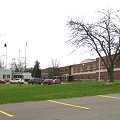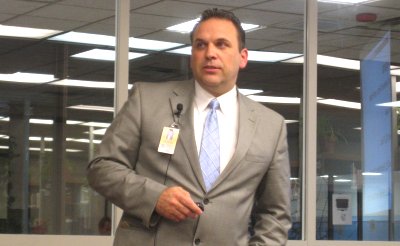- By Dan Veaner
- News
 Print
Print  Why Voters Will Vote To Spend Zero On Two School Capital Projects
Why Voters Will Vote To Spend Zero On Two School Capital ProjectsOn December 8th the Lansing School District is going to ask taxpayers to vote on whether to spend no money. Two propositions will ask for approval for two distinct capital projects at zero additional cost. "We have to rebuild trust with the community," says Superintendent Stephen Grimm. "One of the ways to do that is to build a project that is not going to be an additional tax burden. The next piece of that is to try to implement a financial plan that maps out our long term educational and infrastructure needs."
Grimm began working in the district shortly after the failure of a $20 million capital project in 2007. He decided to take a different approach to addressing failing equipment and infrastructure needs. The first project is an energy performance contract that will upgrade a variety of equipment and pay for itself with a combination of energy savings and state aid. The second project uses $410,509 of EXCEL (Expanding Our Children's Education and Learning) funding that was previously reserved for Lansing along with other state aid plus money from an existing capital reserve fund to replace the roof on the elementary school.
"There is not going to be any additional taxes," Grimm explains. "We are planning to use approximately $180,000 from a capital reserve fund that we already have established. It's part of a capital reserve that was created when the district was planning the capital project that was voted down. There is $550,000 in it."
The end result is that both projects can be completed without adding to Lansing's tax burden. Another piece of good news is that when the PILOT agreement with AES Cayuga kicks in next year, the additional money generated from that will more than replenish the reserve fund.
"We have to be careful how we plan for the additional money that we'll get from AES Cayuga, because the agreement will be reevaluated every three or four years," Grimm says. "It's not necessarily perpetual. So with money like that you want to use it for things like capital projects instead of integrating it with your annual operating costs."
Why vote if the school district is not asking for money? State law requires that taxpayers approve the spending of EXCEL money and reserve funds. And while there is no requirement to vote on an energy performance contract, a winning vote will bring about 10% more state aid to that project.
Grimm worries that voters won't understand what a good deal these projects are for the district. And district Business Administrator Mary June King has warned that if the district does not vote to use its EXCEL money before the end of this year there is a very real chance it will be rescinded by the state which is facing a $12.5 billion deficit. That makes it all the more important that this vote passes.
In 2007 six of the seven district buildings received an unsatisfactory rating by BOCES building inspectors performing a state mandated walk-through inspection. Many of the concerns would have been addressed by the capital project if it had passed. When it did not pass the district was left without a viable plan to fix them.
Grimm says that most of the items identified were not as urgent as they might appear. "Sometimes things fail, not because they're failing, but because they're beyond their estimated lifespan," he explains. "For example a boiler should have a lifespan of 15 years. But now it's 20 years old and it's working great. It's just deemed failing, though it is not actually failing."
But these items will have to be addressed at some point. Grimm says the key is planning that will allow a series of low cost capital projects.

Superintendent Stephen Grimm explains the capital projects
at a school board meeting last Monday
"We have to develop a financial plan that is going to meet the needs of our educational program, and also our infrastructure needs," he says. "In the past we've tried to do what we can within a certain amount of our financial plan. Instead we should have a financial plan reflect what our educational and infrastructure needs are. You can't do that on a yearly basis. You have to look at multiple years. The key thing is truly identifying what needs to be done and mapping it out. It shouldn't be difficult to do. It will never be completely precise, but we should at least have a plan."
Replacing a roof is easy to understand. Grimm says that all of the roofs in the district were replaced in 1985. The high school and middle school roofs were replaced a few years ago. The elementary school roof is 23 years old. It is rated with a useful life of 20 years.
"The roof is leaking into a lot of different areas," he says. "It is leaking down into classrooms, hallways, and a variety of places. Three or four weeks ago a leak started while I was walking down a hallway. We had to bring a mop and a big garbage can to catch the water. Depending on where it's leaking it can cause additional damage. We can't have that."
The energy performance contract is more difficult to understand, but the basic idea is that when energy efficient equipment is installed, it will save money that would have been spent on energy if the older, less efficient equipment were still in place. A combination of state aid and these savings pays for the project, and if all goes well will even realize a modest profit for the district. Johnson Controls, with whom the contract has been signed, guarantees that it will present the district with a check if the estimated savings are not realized.
The project will include simple things such as lower watt light bulbs and window insulating film, new boilers and motors, better humidity control in the high school pool, and a new geothermal heating and cooling system. Another piece will control this equipment as well as the 12,93 computers. Software will montior PC use and turn off the machines at night, realizing a savings of about $18 per machine per year. That alone will save more than $23,000 annually.
Grimm says that it is important that the district listen to voters and restore trust that has been eroded by a growing tax burden over the past several years. "I look at voting as communication," he says. "It's two-way communication. We're presenting a project, people are voting -- they're communicating to us. They're saying we like that or we don't like that. I think the voters in our school district have sent a clear message through the defeat of that capital project and the defeat of a budget."
He sees these two projects as the first step in regaining that trust. When asked what new taxes will be levied as a result of the December vote he is very clear. "Zero," he says. "That is a real zero."
----
v4i45



